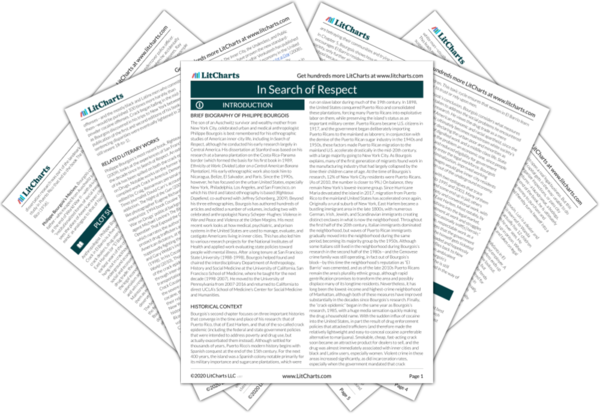The Underground Economy Quotes in In Search of Respect
Cocaine and crack, in particular during the mid-1980s and through the early 1990s, followed by heroin in the mid-1990s, have been the fastest growing—if not the only—equal opportunity employers of men in Harlem. Retail drug sales easily outcompete other income-generating opportunities, whether legal or illegal.
The street in front of my tenement was not atypical, and within a two block radius I could—and still can, as of this final draft—obtain heroin, crack, powder cocaine, hypodermic needles, methadone, Valium, angel dust, marijuana, mescaline, bootleg alcohol, and tobacco. Within one hundred yards of my stoop there were three competing crackhouses selling vials at two, three, and five dollars.
The street culture of resistance is predicated on the destruction of its participants and the community harboring them. In other words, although street culture emerges out of a personal search for dignity and a rejection of racism and subjugation, it ultimately becomes an active agent in personal degradation and community ruin.
In short, how can we expect someone who specializes in mugging elderly persons to provide us with accurate data on his or her income-generating strategies?
To summarize, New York-born Puerto Ricans are the descendants of an uprooted people in the midst of a marathon sprint through economic history. In diverse permutations, over the past two or three generations their parents and grandparents went: (1) from semisubsistence peasants on private hillside plots or local haciendas; (2) to agricultural laborers on foreign-owned, capital-intensive agro-export plantations; (3) to factory workers in export-platform shantytowns; (4) to sweatshop workers in ghetto tenements; (5) to service sector employees in high-rise inner-city housing projects; (6) to underground economy entrepreneurs on the street. Primo captured the pathos of these macrostructural dislocations when I asked him why he sometimes called himself a jíbaro:
Primo: My father was a factory worker. It says so on my birth certificate, but he came to New York as a sugarcane cutter. Shit! I don’t care; fuck it! I ’m just a jíbaro. I speak jíbaro Spanish. Hablo como jíbaro [I speak like a jíbaro].
“Everybody is doing it. It is almost impossible to make friends who are not addicts. If you don’t want to buy the stuff, somebody is always there who is ready to give it to you. It is almost impossible to keep away from it because it is practically thrown at you. I f they were to arrest people for taking the stuff, they would have to arrest practically everybody.”
It is only the omnipresent danger, the high profit margin, and the desperate tone of addiction that prevent crack dealing from becoming overwhelmingly routine and tedious.
Contrary to my expectations, most of the dealers had not completely withdrawn from the legal economy. On the contrary—as I have shown in Chapter 3, in discussing the jobs that Willie and Benzie left to become crack dealers and addicts—they are precariously perched on the edge of the legal economy. Their poverty remains their only constant as they alternate between street-level crack dealing and just-above-minimum wage legal employment. The working-class jobs they manage to find are objectively recognized to be among the least desirable in U.S. society; hence the following list of just a few of the jobs held by some of the Game Room regulars during the years I knew them: unlicensed asbestos remover, home attendant, street-corner flyer distributor, deep-fat fry cook, and night-shift security guard on the violent ward at the municipal hospital for the criminally insane.
The contrast between Ray’s consistent failures at establishing viable, legal business ventures—that is, his deli, his legal social club, and his Laundromat—versus his notable success at running a complex franchise of retail crack outlets, highlight the different “cultural capitals” needed to operate as a private entrepreneur in the legal economy versus the underground economy.
It almost appears as if Caesar, Primo, and Willie were caught in a time warp during their teenage years. Their macho-proletarian dream of working an eight-hour shift plus overtime throughout their adult lives at a rugged slot in a unionized shop has been replaced by the nightmare of poorly paid, highly feminized, office-support service work. The stable factory-worker incomes that might have allowed Caesar and Primo to support families have largely disappeared from the inner city. Perhaps if their social network had not been confined to the weakest sector of manufacturing in a period of rapid job loss, their teenage working-class dreams might have stabilized them for long enough to enable them to adapt to the restructuring of the local economy. Instead, they find themselves propelled headlong into an explosive confrontation between their sense of cultural dignity versus the humiliating interpersonal subordination of service work.
Candy went back to defining her life around the needs of her children. The irony of the institution of the single, female-headed household is that, like the former conjugal rural family, it is predicated on submission to patriarchy. Street culture takes for granted a father’s right to abandon his children while he searches for ecstasy and meaning in the underground economy. There is little that is triumphantly matriarchal or matrifocal about this arrangement. It simply represents greater exploitation of women, who are obliged to devote themselves unconditionally to the children for whom their men refuse to share responsibility.












